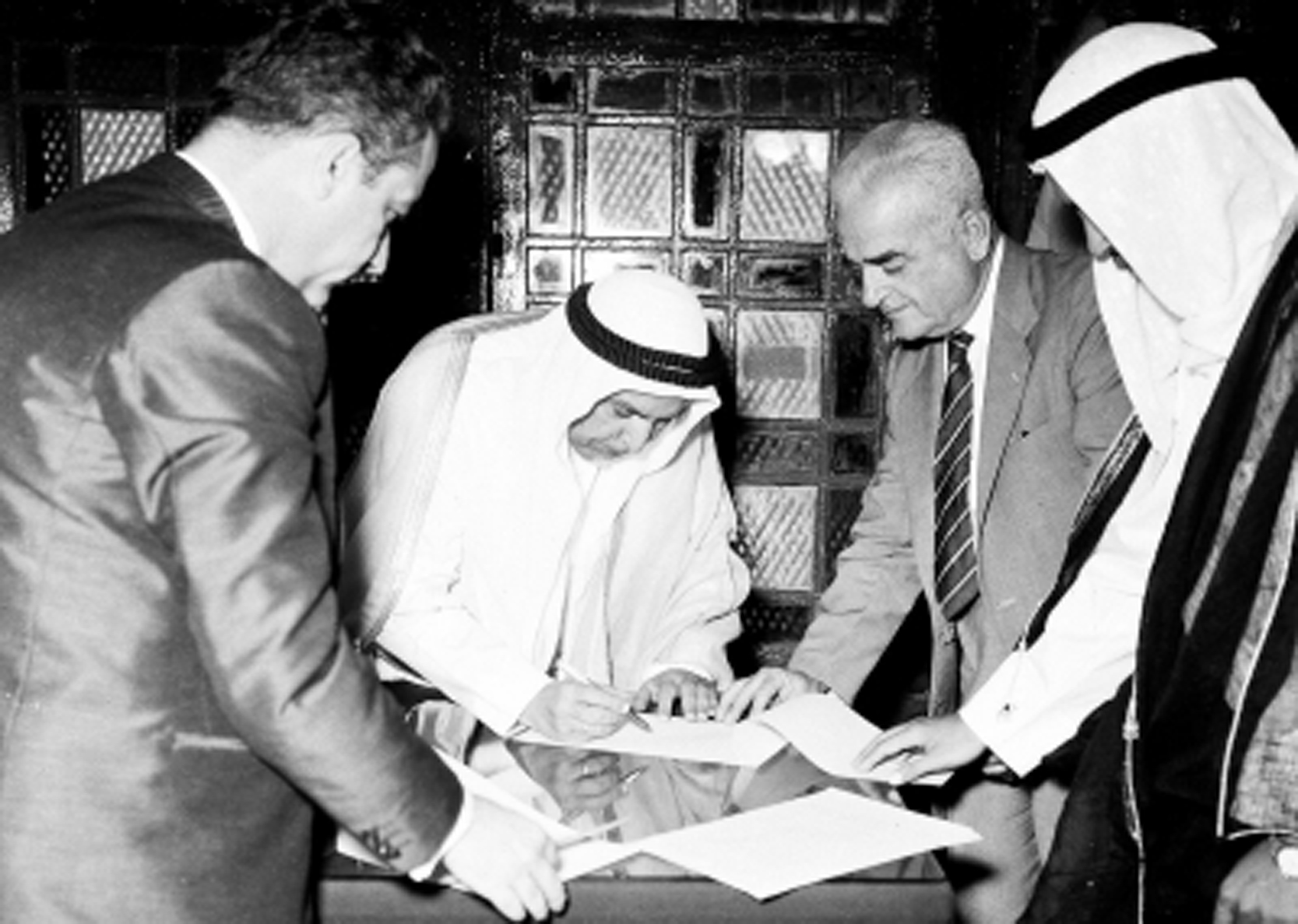LOC11:54
08:54 GMT
 "Father of Independence and Constitution" the late Amir Sheikh Abdullah Al-Salem Al-Sabah and the British commissioner Sir George Middleton
"Father of Independence and Constitution" the late Amir Sheikh Abdullah Al-Salem Al-Sabah and the British commissioner Sir George Middleton
KUWAIT, June 18 (KUNA) -- Kuwaitis will celebrate Sunday the country's Independence Day, which marks the end of the British protection era and Kuwait's gaining of its full Independence.
On June 19, 1961, the independence document was signed by the 11th ruler of Kuwait and "Father of Independence and Constitution" the late Amir Sheikh Abdullah Al-Salem Al-Sabah and the British commissioner for the Arabian Gulf Sir George Middleton on behalf of his government.
The document abolished the agreement signed by late Amir Sheikh Mubarak Al-Sabah, the 7th ruler of Kuwait, with Britain on January 23, 1899, to protect Kuwait against external ambitions.
Upon declaring the independence, the late Amir Sheikh Abdullah Al-Salem, whose rule extended from 1950 to 1965, delivered a speech on the occasion.
"On this memorable day of our beloved nation, on which we transfer from one phase to another phase of history and fold another page of the past with all its components and contents, to open a new page represented in this treaty, which you read now, whereby Kuwait gained its full independence and sovereignty," he said.
The era of the late Amir Sheikh Abdullah Al-Salem was the real set off on the path of independence. He has taken vigorous steps towards establishing independent constitutional state since he took office in 1950.
He worked on issuing laws and legislations that support the establishment of an independent state, like nationality and judiciary organization laws in 1959; monetary law in 1960. Fatwa and Legislation Department was established in the same year.
As an appreciation of the great role played by the late Amir Sheikh Abdullah Al-Salem, a decree was issued in 1963 to integrate the National Day with Accession of the Throne Day, corresponding to February 25th, which is the date when the late Amir ascended to the throne in 1950.
After the independence, an Amiri Decree was issued identifying the form of Kuwait's post-independence flag. At the constitutional level, the first step was crystallized on August 26, 1961 with the enactment of the Amiri Decree calling for general elections to choose members of the constituent council to draft the country's constitution.
Within nine months, the council finalized the draft constitution, consisting of 183 articles, which was submitted to Sheikh Abdullah Al-Salem Al-Sabah, who ratified it on the same day, November 11, 1962.
On the political level, an Amiri decree was issued on August 19, 1961 to establish a foreign department that shall be in charge of the state's foreign affairs and merge Kuwait government secretariat in the foreign department, which turned into the ministry of foreign affairs.
In 1962, Sheikh Sabah Al-Salem was appointed as a foreign minister in the first cabinet lineup, to be followed up by His Highness the current Amir Sheikh Sabah Al-Ahmad Al-Sabah, who was appointed minister of foreign affairs in the second cabinet, formed on January 28, 1963.
On foreign relations, Kuwait submitted an application for membership in the Arab League, whereby the League board held a meeting on July 16, 1961 and passed a decree for accepting it as a member besides its sister Arab countries.
On November 30, 1961, the United Nations Security Council started discussions over Kuwait's request to join the UN. On May 14, 1963, Kuwait got the approval and became the 111th member.
Since its independence, Kuwait has been advancing with solid steps to be an effective player in the international community and has been a major supporter of the UN's role in establishing and promoting world peace and security.
For this same purpose, Kuwait has been active on the international diplomacy to end disputes by peaceful means. It took part in and hosted several peace talks and conference, the latest of which is the current hosting of the UN-mediated intra-Yemeni peace talks.
Kuwait has been leaving indelible marks on the international humanitarian action, which lead the UN to proclaim Kuwait as a "Humanitarian Center" and His Highness the Amir Sheikh Sabah Al-Ahmad Al-Jaber Al-Sabah a "Humanitarian Leader" on September 9, 2014. (end)
ah.ibi